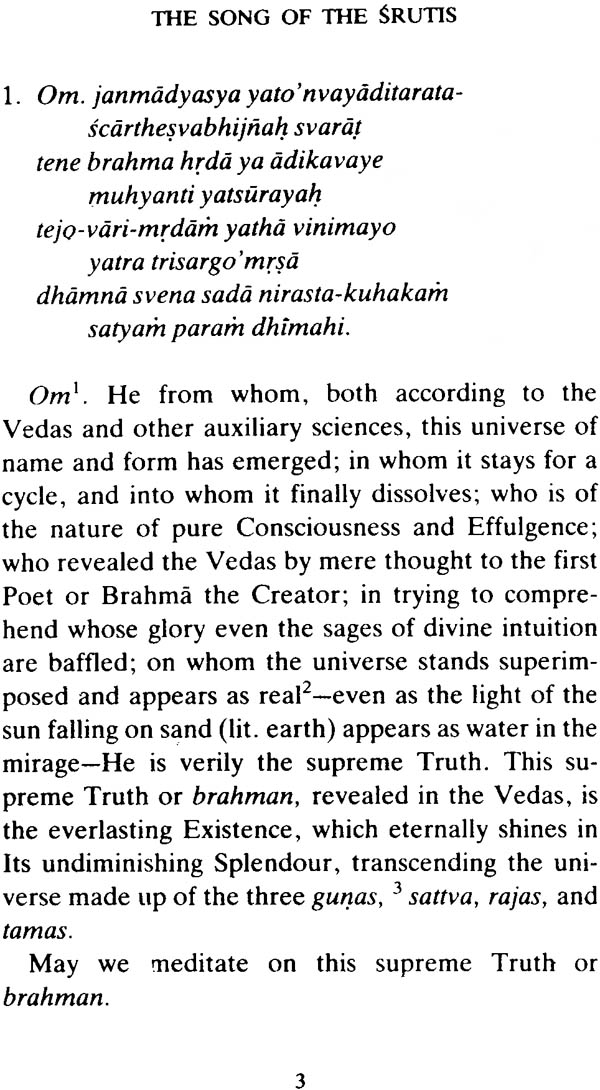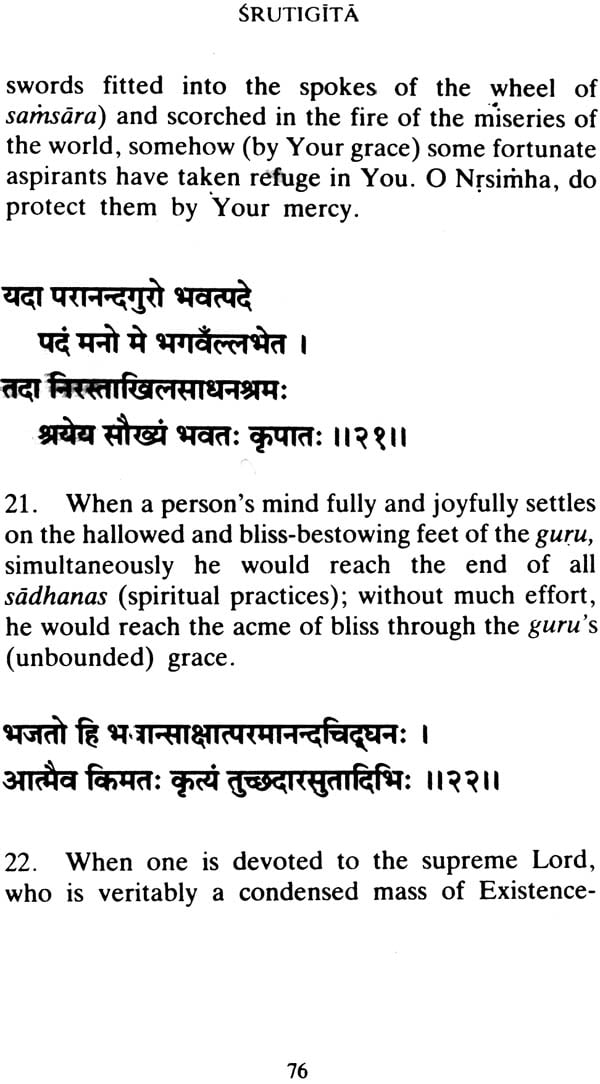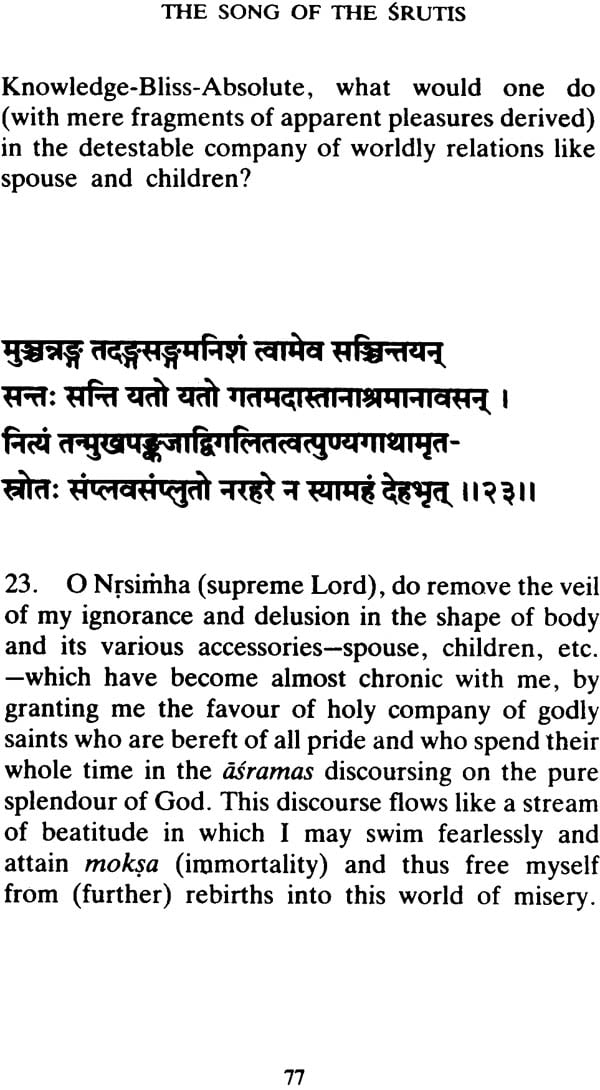
Sruti-Gita or The Song of the Srutis (Text in Devanagari, Roman Transliteration, Word-for-Word Meaning and Detailed Exposition)
Book Specification
| Item Code: | IDJ515 |
| Author: | Swami Gabhirananda |
| Publisher: | ADVAITA ASHRAM KOLKATA |
| Language: | Text in Devanagari, Roman Transliteration, Word-for-Word Meaning and Detailed Exposition |
| Edition: | 2012 |
| ISBN: | 8175051116 |
| Pages: | 103 |
| Cover: | Paperback |
| Other Details | 6.9" X 4.6" |
| Weight | 90 gm |
Book Description
Publisher's Note
After several years, it gives us great pleasure to introduce one more book-Srutigita: The Song of the Srutis-into our Sanskrit-English series. The author has indicated in his informative and instructive 'Introduction' that this is an anthology comprising thirty-three choice verses from the sacred and spiritually elevating scripture, the Bhagavata. Sri Ramakrishna remarked about this holy book (the Bhagavata) in his own unique way: 'It is fried in the ghee of Jnana and soaked in the syrup of bhakti.' The Bhagavata has inspired millions of men and women through the centuries to develop devotion to the supreme Person and to lead a spiritual life of self-abnegation and self-surrender to Him. It is a profoundly philosophical work but saturated with devotion.
Srutigita was first published serially in The Vedanta Kesari in 1976 by Sri Ramakrishna Math, Mylapore, and Madras 600-004. We are grateful to them for permitting us to publish the same in the present form. To make the text more meaningful and useful to the readers, the author has revised and recast the earlier version and added two Appendixes at the end of the book: Appendix I contains thirty mellifluous Sanskrit verses by Sridharasvamin, brimming with poetic grandeur and devotional fervors, from his illuminating tika (gloss) on Srutigita, accompanied by a free rendering of these verses into English; Appendix II offers a few explanatory 'Notes' on certain points in the translation of the original verses, and traces the plausible 'Source Texts' from the scriptures for most of the verses of Srutigita.
We deem it a privilege to offer this book to the public. It is our earnest hope that this will be eagerly and warmly received by the lovers of Sanskrit hymns in general and of the Bhagavata in particular. We send out this book with a firm belief that it will be of real benefit to sincere spiritual seekers.
Introduction
'In the beautiful Book on God, the Bhagavata, is expounded the supreme Religion (dharma) characterized by a complete absence of desire and self-deception. This Religion is practiced by saints who are free from just, greed, anger, jealousy, and other impurities of the mind; it culminates in the destruction of all misery, in the realization of the Existence-Knowledge-Bliss-Absolute, and in the consequent establishment in unalloyed spiritual joy. Not only that, the Bhagavata, composed by the greatest Sage, has a special distinction in that God enters and installs Himself instantaneously in the heart of the devout reciter. No other text has this efficacy. The Bhagavata is the fruition of the celestial tree of the Vedas; it has issued fresh from the divine lips of Sukadeva. O connoisseur of divine poems, drink to your fill this nectarine composition till you are absorbed in the Supreme.'
The Bhagavata is the epitome of the Vedas, the essence of Vedic wisdom. This inspired composition encompasses the entire field of religion and philosophy and is the magnum opus of Vedavyasa, the compiler of the Vedas and the celebrated author of the Mahabharata and the other Puranas. It aims at generating vairagya and bhakti in the heart of the spiritual aspirant striving for perfection and freedom; it appeals to man to live religion, eschewing the futile wrangle over 'name and form'; it exhorts man to renounce his narrow outlook, and develop love for the supreme one, whom men of realization can't by such appellations as Truth, Knowledge, advaya (advaita), Brahman, paramatman, and bhagavan.
A study of this remarkable text will help the spiritual aspirant to grasp the essentials of religion as handed down by Indian tradition. Brahman, isvara, avatara, God-realization, methods of realization, obstacles to realization and the way to overcome them, place of self-effort and of God's grace in the spiritual path, atmajnana and the methods of its acquisition- all these are dealt with elaborately in this Purana. Here, the saints of old, who had overcome their ego and thus the world of the senses, have left a rare legacy of the cream of Vedic knowledge.
Brahman or paramatman is the supreme Reality. It is Consciousness Infinite, Existence Independent and the Source Ultimate of the universe. It is the very support of all beings, and it abides for ever in its own splendour, transcending all limitations. For the sake of revealing Himself to mankind and guiding them, bhagavan, the personal manifestation of the impersonal Absolute, incarnates, now and then, in the world of men and spreads His glory, which forms the nucleus of the inspiring texts known as the scriptures.
Highly developed souls, by reciting and studying the Vedas, attain purity of intellect and get free from selfish desires. Unmindful of and forgoing their own moksa, they purify the world and practise renunciation and serve as models to humanity inspiring it to a more purposeful life. For, when ignorance and attachment to the senses prevail in man, he lives in the quagmire of the sensual world with little hope of emancipation.
The only way out available to him is to take refuge in God, who appears from time to time as guru or spiritual teacher and exhorts man to fix his mind on the Highest, to eschew worldliness and egotism, and to practise pure devotion to the Lord. Thus fulfilling his life, man goes beyond the ever-repeating cycle of births and deaths. The guru teachers the nature of the Lord, who is the only essential existence in a changing world. In reality, man is the supreme Being appearing differently in accordance with the attributes and forms which He chooses to manifest-the attributes and forms which He projects by His inscrutable power called maya.
From a reverential study of the scriptures, man learns the way to atmajnana (knowledge of the self) or Self-realization, which is the fruition of man's life. God does not differentiate between the good and the so-called wicked. He wants both to get absorbed in Him. Thus various modes and methods of devotion-suitable to varying temperaments-lead to the same goal. Hence each mode (employed for absorption in the Lord) deserves as much acceptance as any other.









